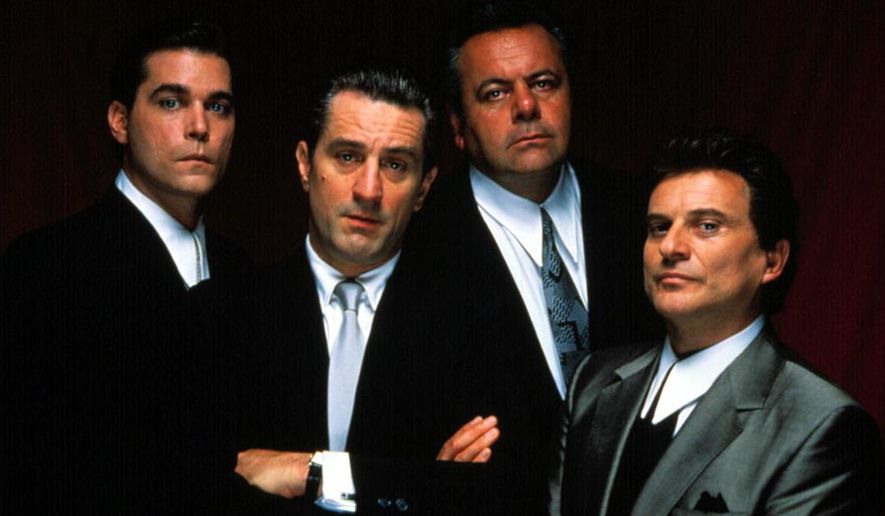OPINION:
Martin Scorsese’s film “Goodfellas” is a violent, dramatic and humorous true story of organized crime, greed and treachery.
The film is based on Nicholas Pileggi’s true crime book “Wiseguy,” the story of Henry Hill’s sordid and colorful life of crime as an associate of the Lucchese crime family. Mr. Scorsese read the book, and he and Mr. Pileggi wrote the screenplay. Thirty years later, “Goodfellas” is considered a classic and remains popular with viewers.
Glenn Kenny, a film critic and journalist, offers a look back at the making of the film in “Made Men: The Story of Goodfellas” (Hanover Square Press).
I reached out to Mr. Kenny and asked him why he wrote the book.
“It’s a movie to which I have a long and deep personal and professional connection,” Mr. Kenny replied. “As I recount early in the book, I first met Martin Scorsese in 1989 when he was editing the film. I was on an assignment to work on an essay with him, about film preservation. And when I went to his office, he was buried in his work on it and full of enthusiasm. He felt the movie was going to be something special, so I was particularly eager to see it. When I did, a little less than a year later, I knew he was right. And as I watched it become a cultural phenomenon, and re-screened it many times, I knew there was a book in the subject. And to do it for the film’s 30th anniversary seemed exactly right.”
Mr. Kenny said he believes Mr. Scorsese is one of our greatest living directors.
“He is one of the few who combines a space-age level of technical expertise with a profound appreciation and understanding of humanity — particularly its darker sides.”
I asked Mr. Kenny how he would compare “Goodfellas” to another classic crime film, “The Godfather.”
“ ‘The Godfather’ is about trying, and failing, to maintain order,” Mr. Kenny said. “At the beginning of the movie, Don Corleone has got all his ducks in a row. Daughter married, business good, one son a trusted criminal confederate, the other ready to be groomed for a career in legitimate business, and so on. And then it all starts to go south, and Don Corleone dies trying to hold it together. And the younger son rebuilds the family with a vengeance.
“ ‘Goodfellas’ is about disorder, anarchy. It’s about guys on the lower end of the mob hierarchy who do whatever they want whenever they want to, as long as the boss gets his cut, or isn’t looking their way. It’s about the thrill of stealing when you need money. As Henry says at the end of the movie “everything was for the taking.” It’s a movie about living in that world, the highs of it and the ultimate low of it.”
I asked Mr. Kenny if Mr. Scorsese’s “Mean Streets” and “The Irishman” are in some way connected to “Goodfellas.”
“Yes, they are almost explicitly connected,” Mr. Kenny said. “ ‘Mean Streets’ is drawn from Scorsese’s own life experience of early manhood in Little Italy and its proximity to criminality. It’s about a young man’s feelings and confusions. ‘Goodfellas’ is about an adult life of criminality — complete irresponsibility in a lot of aspects, but also the whole idea of life with a wife, kids, sometimes competing and contradictory professional allegiances.
“ ‘The Irishman’ is about the criminal in old age. In this case, a man who followed orders because he thought he was protecting an ideal and protecting his family. Who finally comes to see it was all for naught, all a sham, and isn’t spiritually prepared to confront the emptiness he’s brought around himself at the end.”
Why, I asked, are gangster films so popular?
“Even the most decent and upstanding person entertains curiosity about what it’s like to get away with something wrong,” Mr. Kenny said. “In interviews Scorsese has talked about watching vintage gangster movies with his friends and grinning as the characters in them did the worst things. “Why do we love these guys?” he wondered.
So in a way “Goodfellas” is an interrogation of why he — and we — are attracted to this stuff: “Because Scorsese’s filmmaking style is so vivid and dynamic, and the actors in his films so authentic and appealing, they draw us into an aberrant world and make us like it before we really know what we’re being entertained by. It’s seductive, but Scorsese always shows us the ugliness that goes hand in hand with it, as in the movie’s very grisly and unglamorous opening scene.”
“Made Men” is an interesting and illuminating look at a classic and beloved crime film.
• Paul Davis’ On Crime column covers true crime, crime fiction and thrillers.




Please read our comment policy before commenting.